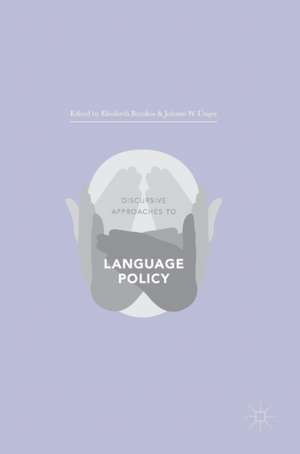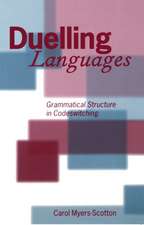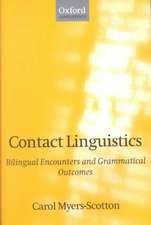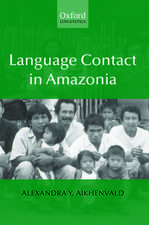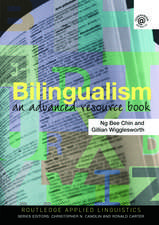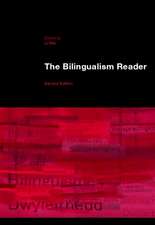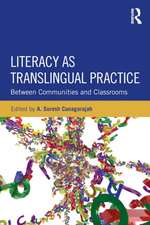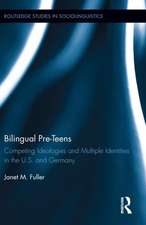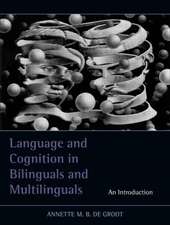Discursive Approaches to Language Policy
Editat de Elisabeth Barakos, Johann W. Ungeren Limba Engleză Hardback – 20 dec 2016
Preț: 889.82 lei
Preț vechi: 1085.14 lei
-18% Nou
Puncte Express: 1335
Preț estimativ în valută:
170.27€ • 178.22$ • 141.72£
170.27€ • 178.22$ • 141.72£
Carte tipărită la comandă
Livrare economică 31 martie-14 aprilie
Preluare comenzi: 021 569.72.76
Specificații
ISBN-13: 9781137531339
ISBN-10: 1137531339
Pagini: 256
Ilustrații: XIII, 299 p. 8 illus., 5 illus. in color.
Dimensiuni: 148 x 210 x 24 mm
Greutate: 5.11 kg
Ediția:1st ed. 2016
Editura: Palgrave Macmillan UK
Colecția Palgrave Macmillan
Locul publicării:London, United Kingdom
ISBN-10: 1137531339
Pagini: 256
Ilustrații: XIII, 299 p. 8 illus., 5 illus. in color.
Dimensiuni: 148 x 210 x 24 mm
Greutate: 5.11 kg
Ediția:1st ed. 2016
Editura: Palgrave Macmillan UK
Colecția Palgrave Macmillan
Locul publicării:London, United Kingdom
Cuprins
Introduction: Why are discursive approaches to language policy necessary?.- PART I THEORETICAL FOUNDATIONS FOR DISCURSIVE APPROACHES TO LANGUAGE POLICY.- Chapter 1: Language policy and critical discourse studies: Towards a combined approach.- Chapter 2: State language policy in time and space: Meaning, transformation, recontextualisation.- Chapter 3: Language policy as metapragmatic discourse: A focus on the intersection of language policy and social identification.- PART II METHODOLOGICAL INNOVATIONS IN DISCURSIVE APPROACHES TO LANGUAGE POLICY.- Chapter 4: A critical integrated approach to language policy as discursive action: Strengths, challenges and opportunities.- Chapter 5: Heteroglossic practices and language ideologies: Combining heteroglossia with critical discourse analysis to investigate digital multilingual discourses on language policies.- PART III EMPIRICAL APPLICATIONS OF DISCURSIVE APPROACHES TO LANGUAGE POLICY.- Chapter 6: Eng flott Diskriminatioun?: Language andcitizenship policy in Luxembourg as experience.- Chapter 7: Luxembourgish language-in-education policy in limbo: The tension between ideologies of authenticity and anonymity.- Chapter 8: Language ideologies regarding English-medium instruction in European higher education: Insights from Flanders and Finland.- Chapter 9: On ‘promoting and demanding’ integration: A discursive case study of immigrant language policy in Basel.- Chapter 10: English language policy as ideology in multilingual Khorog, Tajikistan.- Chapter 11: Commentary.
Recenzii
“The volume provides strong foundational knowledge for graduate students and researchers working in the field of LPP, and I recommend it to those seeking to develop an interdisciplinary lens that brings together the fields of sociolinguistics, language policy, and (critical) discourse studies.” (Pramod K. Sah, Language Policy, Vol. 18, 2019)
Notă biografică
Elisabeth Barakos is a Lecturer in Applied Linguistics at Aston University, Birmingham, UK. Her research interests focus on language policy discourse and practice, multilingualism and language in the workplace from a critical sociolinguistic perspective.
Johann W. Unger is a Lecturer and Academic Director of Summer Programmes at Lancaster University. He researches mainly in the areas of language policy and digitally mediated politics from a critical discourse studies perspective. His 2013 monograph The Discursive Construction of the Scots Language deals extensively with language policy.
Textul de pe ultima copertă
This book brings together the fields of language policy and discourse studies from a multidisciplinary theoretical, methodological and empirical perspective. The chapters in this volume are written by international scholars active in the field of language policy and planning and discourse studies. The diverse research contexts range from education in Paraguay and Luxembourg via businesses in Wales to regional English language policies in Tajikistan. Readers are thereby invited to think critically about the mutual relationship between language policy and discourse in a range of social, political, economic and cultural spheres. Using approaches that draw on discourse-analytic, anthropological, ethnographic and critical sociolinguistic frameworks, the contributors in this collection explore and refine the ‘discursive’ and the ‘critical’ aspects of language policy as a multilayered, fluid, ideological, discursive and social process that can operate as a tool of social change as well as reinforcing established power structures and inequalities.
Elisabeth Barakos is a Lecturer in Applied Linguistics at Aston University, Birmingham, UK. Her research interests focus on language policy discourse and practice, multilingualism and language in the workplace from a critical sociolinguistic perspective.
Johann W. Unger is a Lecturer and Academic Director of Summer Programmes at Lancaster University. He researches mainly in the areas of language policy and digitally mediated politics from a critical discourse studies perspective. His 2013 monograph The Discursive Construction of the Scots Language deals extensively with language policy.
Caracteristici
Systematically explores the interconnectedness of language policy and discourse Illustrates how to turn knowledge gained from research into practical applications to expose and remedy social inequalities and injustices Explores language policy in terms of the multiple layers that are filtered through micro, meso, and macro level discourses
